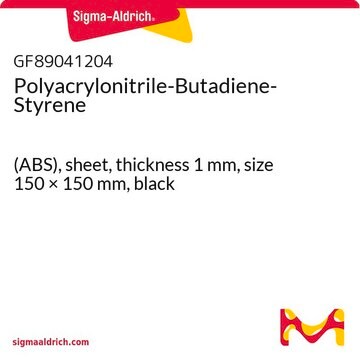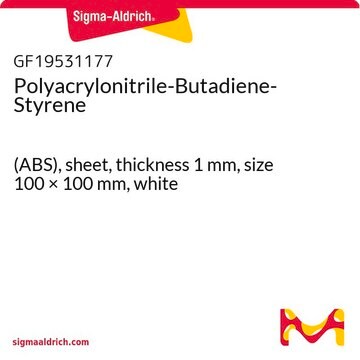180882
Poly(acrylonitrile-co-butadiene-co-styrene)
acrylonitrile ~40 wt. %, powder
Autenticatiper visualizzare i prezzi riservati alla tua organizzazione & contrattuali
About This Item
Formula condensata:
[CH2CH(CN)]x(CH2CH=CHCH2)y[CH2CH(C6H5)]Z
Numero CAS:
Numero MDL:
Codice UNSPSC:
12162002
ID PubChem:
Prodotti consigliati
Stato
powder
Composizione
acrylonitrile, ~40 wt. %
Solubilità
acetone, MEK and DMF: soluble
water and alcohols: insoluble
Densità
1.04 g/mL at 25 °C
Stringa SMILE
C=CC=C.C=CC#N.C=Cc1ccccc1
Cerchi prodotti simili? Visita Guida al confronto tra prodotti
Caratteristiche e vantaggi
High butadiene content.
Codice della classe di stoccaggio
11 - Combustible Solids
Classe di pericolosità dell'acqua (WGK)
WGK 3
Punto d’infiammabilità (°F)
Not applicable
Punto d’infiammabilità (°C)
Not applicable
Dispositivi di protezione individuale
Eyeshields, Gloves, type N95 (US)
Scegli una delle versioni più recenti:
Possiedi già questo prodotto?
I documenti relativi ai prodotti acquistati recentemente sono disponibili nell’Archivio dei documenti.
Brad M Isaacson et al.
Journal of rehabilitation research and development, 46(9), 1109-1120 (2009-01-01)
Developing noninvasive tools that determine implant attachment strength to bone and monitor implant stability over time will be important to optimize rehabilitation protocols following insertion of osseointegrated implants in patients with limb loss. While resonance frequency has been previously shown
Xinmin Liu et al.
Environmental technology, 33(16-18), 1987-1992 (2012-12-18)
The disposal of waste plastic crusts of televisions is an issue that is gaining increasing interest around the world. In this investigation, the pyrolysis and catalytic cracking of the waste television crusts mainly composed of acrylonitrile--butadiene-styrene copolymer was studied. Thermogravimetric
Chia-Yuan Chang et al.
Bioresource technology, 102(9), 5337-5344 (2011-01-18)
A two-stage aerobic membrane bioreactor (MBR) system for treating acrylonitrile butadiene styrene (ABS) resin wastewater was carried out in this study to evaluate the system performance on nitrification. The results showed that nitrification of the aerobic MBR system was significant
Martin Schlummer et al.
Waste management & research : the journal of the International Solid Wastes and Public Cleansing Association, ISWA, 24(6), 573-583 (2007-01-27)
Shredder residues produced in plants processing waste electric and electronic equipment are excluded from material recycling due to a variety of polymeric materials and the presence of brominated flame retardants (BFR), which might contain banned polybrominated diphenyl ethers or toxic
Bo Lai et al.
Huan jing ke xue= Huanjing kexue, 32(4), 1055-1059 (2011-07-02)
Wastewater from the condensation and drying section of acrylonitrile-butadiene-styrene (ABS) resin plant was pretreated by the microelectrolysis, and the effect of the influent pH value on the pollution removal efficiency of the microelectrolysis was mainly studied. In order to study
Il team dei nostri ricercatori vanta grande esperienza in tutte le aree della ricerca quali Life Science, scienza dei materiali, sintesi chimica, cromatografia, discipline analitiche, ecc..
Contatta l'Assistenza Tecnica.







